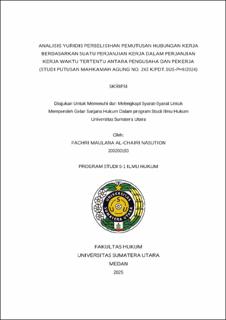Analisis Yuridis Perselisihan Pemutusan Hubungan Kerja Berdasarkan Suatu Perjanjian Kerja dalam Perjanjian Kerja Waktu Tertentu antara Pengusaha dan Pekerja (Studi Putusan Mahkamah Agung No. 243 K/Pdt.Sus-Phi/2024)
Legal Analysis of Termination of Employment Disputes Based on an Employment Agreement in A Fixed-Term Employment Agreement Between Employers and Workers (Study of Supreme Court Decision No. 243 K/Pdt.Sus-Phi/2024)

Date
2025Author
Nasution, Fachri Maulana Al-Chairi
Advisor(s)
Kamello, Tan
Yudhistira, Eko
Metadata
Show full item recordAbstract
The work environment and disputes are two inseparable aspects. Disputes between employers and employees that cannot be resolved wisely by both parties may lead to termination of employment (PHK). In the case of a Fixed-Term Employment Agreement (PKWT), termination occurs when the agreed-upon contract period ends. However, if termination is carried out by one party before the contract period expires, it can cause losses to the other party, particularly for employees who are economically in a weaker position compared to employers. In Case No. 243 K/PDT.SUS-PHI/2024, the company terminated an employee without providing an explanation or compensation as stipulated in Article 62 of the Manpower Law. The purpose of this study is to examine the legal standing of employment agreements in relation to termination of employment under legislation and to analyze legal protections for employees affected by unilateral termination based on an employment agreement. Additionally, it evaluates the legal considerations of the Supreme Court in Decision No. 243 K/PDT.SUS-PHI/2024 concerning termination of employment under a fixed-term employment agreement between a company and an employee. This study employs a normative juridical research method. The data collection technique involves a legislative approach, referring to Kitab Undang undang hukum Perdata, Undang-Undang No. 13 on Manpower, and Undang Undang No. 2 tahun 2004 on Industrial Relations Dispute Resolution. The results of this study indicate that the legal standing of an employment agreement in cases of termination of employment by a company holds greater authority than general labor legislation. Consequently, if an employee is terminated based on reasons agreed upon in the employment contract, such termination is considered lawful. Legal protection for employees who are unilaterally terminated under a fixed-term employment agreement includes seeking resolution through bipartite negotiations. If this fails, the process continues with tripartite mediation, followed by proceedings in the Industrial Relations Court. The Supreme Court's Decision No. 243 K/PDT.SUS-PHI/2024 is deemed appropriate; however, its legal considerations were incomplete and unclear. The Supreme Court panel should have provided comprehensive and well-explained legal reasoning.
Collections
- Undergraduate Theses [2775]
